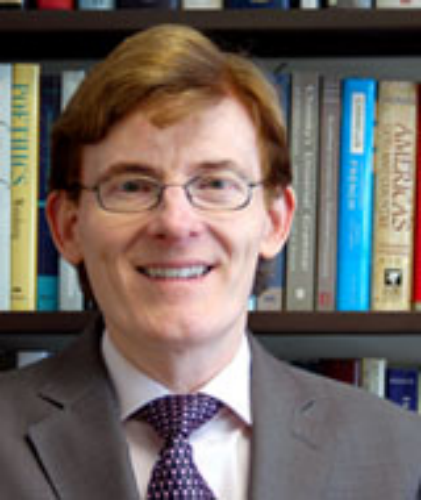Aug 06, 2009
Airline Regulation And The Future Of International Aviation Explored in New Book By DePaul Law Professor Brian Havel
Airline Regulation And The Future Of International Aviation Explored in New Book By DePaul Law Professor Brian Havel
Ongoing deregulation of the international air transport industry has revealed a compelling need for entirely new forms of governance. In his new book, “Beyond Open Skies: A New Regime for International Aviation” (Kluwer 2009), DePaul University College of Law professor and associate dean Brian Havel explores the legal and policy structure needed to effectively govern international civil aviation in the future. Havel, who also directs the university’s International Aviation Law Institute, provides a critical analysis of aviation’s regulatory framework and addresses how it may obstruct the industry from serving the public and delivering benefits to employees and investors alike.
“Just over a year ago, an agreement between the United States and the European Community (E.C.) went into provisional effect and culminated in a policy of international air transport liberalization referred to as ‘open skies,’” said Havel. “Even though the agreement is historic and significant, in actuality it is more of a staging post on the journey to a truly open trans-Atlantic aviation marketplace. By analyzing the law and policy of U.S. and E.C. deregulation and integrating that analysis into a framework for future negotiations, this book argues for an intensification of the competitive forces that liberalization has stimulated at both the trans-Atlantic and global levels.”
To accomplish this, Havel engages in a comprehensive analysis of airline deregulation in the U.S. and E.C. against the backdrop of the international aviation legal order established by the 1944 Chicago Convention on International Civil Aviation. “Beyond Open Skies” draws upon a variety of sources—including very recent developments in the U.S. and E.C.— to examine the potential of the “open skies” initiative following the historic 2007 U.S./E.C. Air Transport Agreement to inspire a genuine globalization of the world’s air transport industry. Ownership and citizenship requirements, route selection, airline identity, capacity, pricing regimes, regulatory harmonization, labor laws and dispute resolution all come into play.
Among Havel’s suggested core principles for a second-stage U.S./E.C. agreement are:
- Eliminating “managed trade” and allowing airlines to compete under uniform objective rules with the freedom to access markets, establish prices and determine frequency of service;
- Removing the present “freedoms of the air” artifice to open all points within the territories of the agreement’s participants to all the participants’ air carriers, without requiring that routes be connected to a “home” or destination city;
- Dismantling the so-called “nationality rule,” which restricts the ownership of airlines, by recasting the traditional airline/state identity as a right of establishment; and
- Adopting a deep integration program of regulatory convergence to ensure a level commercial playing field among all carriers.
“The information and perspective presented in ‘Beyond the Open Skies’ are especially timely today as the worldwide economic collapse has highlighted the crisis the international aviation industry faces,” said Havel. “Jobs, airline routes and flight frequencies are being slashed by companies struggling to remain viable in today’s changing economy. Reform must transcend domestic debates about incremental public intervention to provide adequate air transport.”
Note to Editors: To obtain a review copy of “Beyond the Open Skies,” visit Kluwer’s Web site at www.kluwerlaw.com/CustomerServ/. Brian Havel can be reached at 312/362-5222 or bhavel@depaul.edu.

Brian Havel, DePaul College of Law professor, associate dean and author of "Beyond Open Skies"
